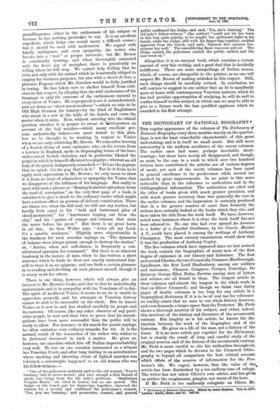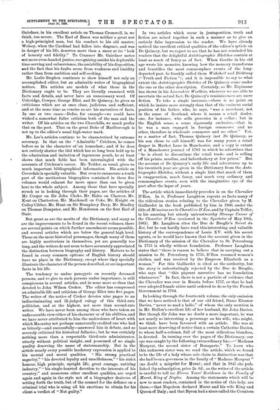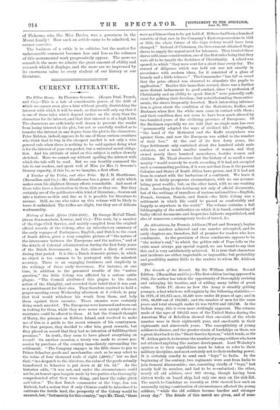THE DICTIONARY OF NATIONAL BIOGRAPHY.*
THE regular appearance of the volumes of The Dictionary of National Biography every three months exactly on the quarter-
days, is not the least remarkable characteristic of this great undertaking, and is in itself no small merit. But still more noteworthy is the uniform excellence of the recent volumes. The earlier ones had some, perhaps inevitable, short- comings; but these have nearly all disappeared, and though, as must be the case in a work to which over two hundred writers have contributed, the articles are of various degrees of merit, yet each of the recent volumes has been equal in general excellence to its predecessor, while several are marked by great improvements. In no point is this more noticeable than in the reference to authorities and in the bibliographical information. The authorities are cited and the titles of books given with much greater precision, and with much greater accuracy, than was generally the case in the earlier volumes, and the impression is certainly produced that in a far greater number of cases than formerly the writers have actually looked at the books which they cite, and have taken the title from the work itself. We have, however, noted some instances where it is clear the book itself has not been referred to. No one who had ever opened An Answers
to a Letter of a Iesuitecl Gentleman, by his Cousin, Master A. C., could have placed it among the writings of Anthony Champney. The most cursory examination would show that it was the production of Anthony Copley.
The five volumes which have appeared since we last noticed the book, contain the biographies of many men of the first degree of eminence in our history and literature. The first and second Charles, the two Cromwells, Cranmer, Marlborough, Lyndhurst, the first Lord Shaftesbury, among our soldiers and statesmen ; Chaucer, Congreve, Cowper, Coleridge, De Quincey, George Eliot, Defoe, Darwin, among men of letters and science, are all found in them. The longest article in these volumes, and almost the longest in the whole work, is that on Oliver Cromwell; and though we think that thirty pages of double columns is too long for any article in a biographical dictionary if it is to be of real use for reference we readily admit that no man in our whole history deserves, and even demands, a larger space than the Protector. Mr. Firth shows a thorough mastery of his subject, and (what, indeed, this involves) of the history and literature of the seventeenth century. But lengthy as is his article, he knows the dis- tinction between the work of the biographer and of the historian. He gives us a life of the man, not a history of the times. It is no mere article put together for the Dictionary,
but is clearly the result of long and careful study of the original sources, and of the history of the seventeenth century. Mr. Firth is most careful to cite his authorities throughout, and the two pages which he devotes to the Cromwell biblio- graphy is beyond all comparison the best critical account wlitch erlstg of the sources of information for the Pro- tector's life. We regret, however, that the value of theq article has been diminished by a too uniform tone of eulogy. The writer has not taken Oliver's own advice, and has given us neither the roughnesses, pimples, nor warts of his hero.
If Mr. Frith is too uniformly eulogistic on Oliver, Mr.
• Dictionary of National Biography. Edited by Leelie Stephen. Vols. X.-X117. London: Smith, Elder, and 00. 1887-88.
Gairdner, in his excellent article on Thomas Cromwell, is, we think, too severe. The Earl of Essex was neither a great nor a high-principled man, but his conduct to his old master, Wolsey, when the Cardinal had fallen into disgrace, and was in danger of his life, deserves more than a sneer at its "look of honesty and fidelity." To Cranmer Mr. Gairdner metes out more even-handed justice, recognising amidst his deplorable time-serving and subservience, the amiability of his disposition, and the fact that his faults arose from weakness and timidity rather than from ambition and self-seeking.
Mr. Leslie Stephen continues to show himself not only an accomplished editor, but an admirable writer of biographical notices. His articles are models of what those in the Dictionary ought to be. They are literally crammed with facts and details, and never have an unnecessary word. Of Coleridge, Cowper, George Eliot, and De Quincey, he gives us criticisms which are at once clear, judicious, and sufficient, and at the same time as concise as are his narratives of facts. In one or two cases—Defoe, for example—we could have wished a somewhat fuller criticism both of the man and the writer. Of his articles on the two Churchills, we much prefer that on the poet. That on the great Duke of Marlborough is not up to the editor's usual high-water mark.
Mr. Lee's articles continue to be characterised by extreme accuracy. In that on the " Admirable " Crichton, he comes before us in the character ot an iconoclast; and if he does not entirely shatter the idol which has so long been held up to the admiration and imitation of ingenuous youth, he at least shows that much fable has been intermingled with the accounts of Crichton's career. Mr. Tedder, as usual, gives us much important bibliographical information. His article on Coverdale is specially valuable. But even to enumerate a tenth part of the meritorious biographies contained in these five volumes would exhaust far more space than can be given here to the whole subject. Among those that have specially struck us in looking through their pages, are the articles of Mr. Cooper on Sir John Cheke, Mr. Hales on Chaucer, Mr. Kent on Chatterton, Mr. Macdonell on Coke, Mr. Knight on Colley Cibber, Mr. Hunt on Sir Humphrey Davy, Mr. Bradley on Thomas Dempster, and Mr. Henderson on the first Earl of Stair.
But great as are the merits of the Dictionary, and many as are the improvements to be found in the recent volumes, there are several points on which further amendment seems possible, and several articles which are below the general high level. Those on the more historical personages, though many of them are highly meritorious in themselves, yet are generally too long, and the writers do not seem to have accurately appreciated the distinction between biography and history. Matters to be found in every common epitome of English history should have no place in the Dictionary, except where they specially illustrate the character of the person described, or are important facts in his life.
The tendency to undue panegyric on recently deceased persons, and to give to such persons undue importance, is still conspicuous in several articles, and in none more so than that devoted to John Wilson Croker. The editor has compressed an admirable life and criticism of George Eliot into five pages. The writer of the notice of Croker devotes nine pages to an indiscriminating and ill-judged eulogy of this third-rate politician, and at the highest, not more than second-rate writer. We have never been among those who have taken an unfavourable view either of his character or of his abilities, and we have never attributed to him the malevolence of heart with which Macaulay not perhaps unnaturally credited one who had so bitterly—and successfully—answered him in debate, and so severely criticised his historical fallacies ; but he was certainly nothing more than a respectable third-rate administrator, utterly without political insight, and possessed of no single quality deserving the name of statesmanship. But in the article nearly every possible laudatory expression is applied to
his mental and moral qualities. "His strong practical sagacity," "his devoted loyalty and unselfishness," "his strict honour, high principle, upright life, great courage, untiring
industry," "his single-hearted devotion to the interests of his country," and numerous other excellent qualities, are urged again and again in the style not of a biographer desirous of setting forth the truth, but of the counsel for the defence on a criminal trial who is using all his exertions to obtain for his client a verdict of "Not guilty."
In two articles which occur in juxtaposition, truth and fiction are mixed together in such a manner as to give an entirely false impression to the reader. We have already noticed the excellent critical qualities of the editor's afiticle on De Quincey, but we regret to see that he has not reminded his readers that the delightful Autobiographic Sketches contain at least as much of fancy as of fact. When Goethe in his old age wrote his memoirs, knowing how the memory transforms and beautifies the most commonplace events of the long- departed past, he frankly called them Wahrheit and Dichtung (" Truth and Fiction ") ; and it is impossible to say to what extent the Autobiographic Sketches of De Quincey come under the one or the other description. Certainly, as Mr. Espinasse has shown in his Lancashire Worthies, wherever we are able to ascertain the actual fact, De Quincey's reminiscences are mere fiction. To take a single instance,—there is no point on which he insists more strongly than that of the eminent social position of his father, who, he says, "was a merchant, not in the sense of Scotland, where it means a retail dealer, one, for instance, who sells groceries in a cellar ; but in the English sense, a sense rigorously exclusive,—that is, he was a man engaged in foreign commerce and no other, therefore in wholesale commerce and no other." Yet, as a matter of fact, Thomas Quincey (not De Quincey, as his son chose to call himself) was for many years a retail draper in Market Lane in Manchester, and a copy is extant of a Manchester journal of 1783 in which he advertises that "he is about to discontinue the retail trade, and is selling off his prints, muslin% and haberdashery at low prices." But the account of De Quincey's early life and adventures up to his twentieth year are given in the Dictionary from the Auto- biographic Sketches, without a single hint that much of them is exaggeration, much fancy, and much very ordinary and commonplace events, seen with the imaginative eye of the poet after the lapse of years.
The article which immediately precedes is on the Chevalier D'Eon. In it, Professor Laughton repeats as facts many of the ridiculous stories relating to the Chevalier given by M. Gaillardet in the book published by him in 1866, under the title of Memoires sur la Chevaliere D'Eon, and by Captain Telfer, in his amusing but utterly untrustworthy Strange Career of the Chevalier D'Eon (reviewed in the Spectator of May 16th, 1885). Mr. Laughton cites the Due de Broglie's Secret du Roi, but he can hardly have read this interesting and valuable history of the correspondence of Louis XV. with his secret agents, or he would have known that the account given in the Dictionary of the mission of the Chevalier to St. Petersburg in 1755 is wholly without foundation. Professor Laughton states that "there is reason to believe that in carrying out a mission to St. Petersburg in 1755, D'Eon resumed women's clothes, and was received by the Empress Elizabeth as a woman." For this Gaillardet is cited as the authority, but the story is unhesitatingly rejected by the Due de Broglie, who says that "this piquant narrative has no foundation whatsoever." In fact, there is not a particle of evidence that the Chevalier was ever in Russia before 1757, or that he had ever adopted female attire until ordered to do so by the French Government in 1764.
In looking through the fourteenth volume, the only omission that we have noticed is that of our old friend, Dame Eleanor Davies, "never so mad a ladle," of whom the only mention is in Mr. Bullen's excellent life of her husband, Sir John Davies. But though Sir John was no doubt a more important, he was not nearly so interesting a personage as his wife, who might, we think, have been favoured with an article. She was at least more deserving of notice than a certain Catherine Davies, to whom half-a-column, full of the most ridiculous blunders, is devoted. In turning over the pages of the Dictionary, our eye was caught by the following extraordinary line,—" Madame Mauprat, the second sister of Bonaparte." To learn who this unknown sister was, we read the article, which we found to be the life of a lady whose sole claim to distinction was that
she had been a governess in the family of "Madame Mauprat " (no doubt a misprint for Murat), and that in 1841 she pub- lished (by subscription, price 2s. 6d., as the writer of the article
is careful to tell us) Eleven, Years' Residence in the Family of Murat, King of Naples. Among the statements which will be new to most readers, contained in the notice of this lady, are these,—that Napoleon declared Murat and his wife King and Queen of Italy ; and that Byron had a niece called the Countess
of Picherno, who, like Miss Davies, was a governess in the Murat family ! How such an article came to be admitted, we cannot conceive.
The business of a critic is to criticise, but the matter for unfavourable comment becomes less and less as the volumes of this monumental work progressively appear. The more we consult it, the more we admire the great amount of ability and research which it displays, and the more are we impressed by its enormous value to every student of our history or our literature.




















































 Previous page
Previous page